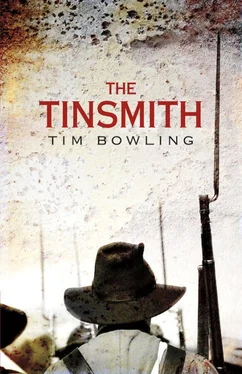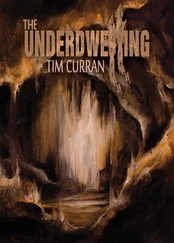He stepped around the corner of the house and approached the canvas tent. It was even more familiar than before, its sag like an admission of the weight of the years. Anson walked to the fire. The coals were still red, still giving off heat. He looked around and let his eyes rest on the stand of cottonwoods just beyond the tent. The trees stood dark in the clear light. They seemed to breathe, to form something animal. Anson watched them and did not realize with how much anticipation until he heard his own short breaths.
“Hello? Is anyone here?”
Only silence returned his call. He fought off the feeling that the woods, the tent, and the absent man were part of the same unease. But the longer he stood by the fire, breathing the wood smoke, the more the feeling came back to him, intensified. So he walked to the house and knocked loudly on the front door. It opened on contact. Anson called out a greeting, then stepped in.
The air reeked of fish and sweat. He opened a door off the entrance and looked in on emptiness: no furnishings at all, just bare planks. Puzzled, he moved along the hall and tried another door. This time, he came upon a large room that looked like an Indian village of the sort he’d observed at spots along the Washington coast—clothes, hides, furs, cooking utensils, and a powerful odour, that curious mix of the human and wild that defined the riverbanks at Chilukthan and was captured here in an enclosed space. Some pieces of fishnet were stretched across the floor, no doubt for the purposes of mending. So Dare had given his house up to the workers for the duration of the season. That did not seem out of character for the man Anson remembered. Besides, Dare had never seemed like a man who’d prefer a parlour to an open field.
Outside again, Anson drew the obvious conclusion: if Dare had just left the fire, then he’d be at the cannery. He hurried toward the dike.
Now even the Indian children had vanished. He wondered if they’d really been there at all. Crescent Slough was disturbingly still. Where were the Indians? Surely not all of them went out on the boats? And the Chinese? If Dare had managed to replace his crew, they’d likely be somewhere nearby. At the very least, there should be some activity once he reached the cannery buildings.
But, at the campfire, evidence of recent activity was everywhere, from the smell of grease and oil and smoke to the slop of fish heads and guts over which buzzed clusters of flies. When Anson peered through the gaps in the wharf planks at his feet and saw a fleet figure rummaging in the muck of the low tide, he breathed a sigh of relief. It was just what the Indian children did at the Lansdownes’ cannery; they scavenged for the knives that had slipped out of the workers’ hands during the frenzy of making the pack.
He walked into the darkness of the main building. The sudden stifling of the gull cry was like the slamming of a door. The machines were silent, greasy with death.
“William! Are you here?”
He cried out in the same way that he’d throw a rope to a drowning man, only Anson could not shake off the feeling that he was the one struggling in the water.
But a living man did emerge from the bloodied shadows. It was the elderly Chinese with the smoky eye.
“Where is everyone?” Anson said.
“They sleep. Others fish. Much, much work to do.”
“Your boss? Is he sleeping too?”
The Chinese grinned so broadly that Anson could count his three gold-capped teeth.
“He never sleep. He not need it. Maybe he get all his sleep in winter.”
“Well, where is he then?”
“On the river. He just left. More trouble maybe.”
“Trouble? What sort of trouble?”
The grin disappeared. The Chinese scratched his chin with a long fingernail. “Very bad this year. Others try to fish our drifts. He take his gun.”
Instinctively, Anson turned toward the river. But all he could see through the open side of the cannery was a rectangle of blue sky.
“Which others?”
The Chinese shrugged. His good eye flickered. “All of them maybe.”
All of them? Anson struggled to shut out the image of dozens of armed white men surrounding Dare.
“When do you expect him back?”
The Chinese turned his palms up. They were like old parchment.
“I’ll wait,” Anson said.
As if the words were a spell, the Chinese slipped away at the utterance of them.
But wait where? Anson decided that a shady spot under a tree would suffice. Perhaps he might even manage a few hours of sleep. Outside again under the gull cry, he passed a towering stack of wooden crates stamped with the label “Fraser River Salmon Dare Cannery.” An arched silver salmon circled by bold red appeared above the words. It was a comfort to Anson to see that the season was proving productive for his old friend. Surely when the fish ran in such abundance, there’d be profits enough for all the canners. So why the trouble? Anson smiled at the question, pleased that it would even occur to him after all he’d lived through. The hope in it calmed his nerves, made death retreat. Soon, he’d ask Dare the question directly, perhaps over a campfire at the edge of a brooding wood.
He walked along the top of the long, earthen dike that, unlike the one at Chilukthan, fronted the entire settlement, until he saw a large cottonwood casting a broad net of shade over a field of knee-high grass. At the sight of the tree, a sudden weariness came over him. He descended the dike and crossed the field, grasshoppers whirring and leaping at his every step. The murmurous late morning opened so gently that all thoughts of conflict washed away as he took up a position near the thick trunk and shut his eyes. Through all the horrible suffering and deaths, through the severing and rejoining of his country, through his own losses and failures, Anson had not lost the capacity to recognize and revel in the earth’s own offerings of grace. They did not occur regularly, but he knew the fault was his—the toil of work and society, the mind’s relentless worrying of the past, kept the spirit closed from most opportunities for a natural, human rest. Yet they still occurred: he could still feel himself embraced by something outside of all conscious planning, even if he no longer cared to use the name of God to describe that presence, the God that both sides in the war had used as justification for killing.
The moment did not cease, nor did Anson open his eyes. Gradually his breathing and pulse slowed, and the world—Antietam, Chilukthan, the eyes of the dying and the healing—joined him in the balm of darkness.
He woke to voices and frenzied gull cries. At first, he thought they were rapidly approaching him and he raised an arm as if to fend off a blow. But then he realized that they came from the dike and that they rose and fell in varying levels of excitement. Anson stood quickly, for the voices meant one thing: the boats had returned.
When he reached the cannery, he saw that the harvest had not abated. Two large scows—each twenty feet long and a dozen wide—squirmed with salmon. Six Indian men stood waist-deep in the fish, flinging them as if they were silver blossoms onto the main wharf, where two Chinese, their pigtails swinging in almost perfect unison, transferred them to wheeled wooden carts. These were then shoved hurriedly by other Chinese into the cannery, which had begun to hiss and grind and clatter as if on the verge of explosion.
The gulls whirled over the wharf, beating their wings as they dropped as close as possible to the fish before some human motion dampened their appetites and blew them back skyward. The din was fierce. The closer Anson came to the wharf, the harder it was to hear the voices. As he stepped out of the buildings’ shadows and approached the river, he felt the equal ferocity of the heat and squinted up. The sun, just past its apex, burned small and white. Anson calculated he had slept at least two hours, but the contrast with his moment of spiritual reflection made it seem more like two years. Already he smelled that curious mixture of smoke, blood, and river that at once alerted and confused his senses. It was a potent, almost overpowering smell that quickened the pulse even as it held out the promise of nothing but carnage. No wonder the gulls had gone mad. They kept breaking like a whitecapped surf against the brown bodies sweating in the scows.
Читать дальше












